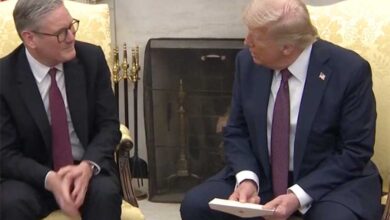Starmer seeks to avoid Trump tariffs after ‘productive’ talks with US

Unlock the White House Watch newsletter for free
Your guide to what the 2024 US election means for Washington and the world
Sir Keir Starmer has held what Downing Street called “productive” trade negotiations with US President Donald Trump, as he seeks to avert punitive tariffs on British exports from April 2.
But Whitehall officials have cautioned that Britain may well be hit by Trump’s threatened global tariffs on what the US president calls “liberation day” on Wednesday.
One official said: “April 2 should not be seen as the end of the process. We will carry on talking to get the best possible deal for Britain.”
Starmer, who has had regular phone calls with Trump in recent weeks, has said that Britain would be “pragmatic and clear eyed” in its response if exports of UK-made cars and other goods are hit by US tariffs.
Although Downing Street has made it clear that no options are off the table, Starmer has played down the prospect of immediate UK retaliation, arguing that a trade war would not be in Britain’s interest.
Number 10 confirmed a conversation had taken place between Trump and Starmer on Sunday and said: “They discussed the productive negotiations between their respective teams on a UK-US economic prosperity deal, agreeing that these will continue at pace this week.”
Lord Peter Mandelson, Britain’s ambassador to Washington, is seeking to engineer an economic deal that would see Britain given a carve-out from Trump’s threatened reciprocal global tariffs.
Britain has spoken to the Trump team about scaling back or axing its digital services tax, which is set to raise £800mn this year and particularly affects big US tech companies.
But the UK car industry told Sarah Jones, industry minister, on Friday that it did not want to see immediate UK retaliation if Trump presses ahead with his threat of 25 per cent tariffs on foreign-made cars entering the US.
“The industry does not want a trade war, but it’s important that we keep all options on the table,” Starmer said last week.
Carmakers have instead demanded that ministers develop a “holistic approach” to supporting the UK auto industry, including through lower energy costs, increased training and better regulation.
The independent Office for Budget Responsibility, the fiscal watchdog, has warned that Britain’s GDP would be 1 per cent lower next year in the event of the most “severe” global trade war.
That would almost eliminate UK chancellor Rachel Reeves’ £9.9bn of headroom against her fiscal rules, announced last week in the Spring Statement, and increase the likelihood that she would have to raise taxes in an autumn Budget.






